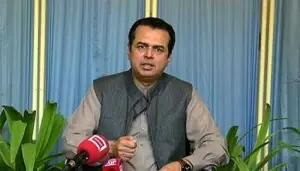Supreme Court restores NA, orders voting on no-trust move on Saturday
9 min readThe Supreme Court on Thursday restored the National Assembly, declared the ruling of National Assembly deputy speaker issued on April 3 null and void and also declared the dissolution of the House illegal and against the Constitution.
The top court issued the verdict in the suo moto case related to the ruling of National Assembly Deputy Speaker Qasim Suri to dismiss the no-confidence motion against Prime Minister Imran Khan on April 3, followed by the dissolution of the National Assembly by President Arif Alvi on the premier's advice.
"It is declared that the [no-confidence] Resolution [against the prime minister] was pending and subsisting at all times and continues to so remain pending and subsisting," read the SC's short order.
A five-member larger Supreme Court bench headed by Chief Justice of Pakistan Justice Umar Ata Bandial and comprising Justice Munib Akhtar, Justice Jamal Khan Mandokhail, Justice Ijazul Ahsan and Justice Mazhar Alam Khan Miankhel issued the unanimous verdict.
The apex court in its order said the prime minister could not advice the president to dissolve the assembly due to a no-confidence motion already in process against him under Article 58 of the Constitution.
"It is declared that at all material times the prime minister was under the bar imposed by the Explanation to clause (1) of Article 58 of the Constitution and continues to remain so restricted. He could not therefore have at any time advised the President to dissolve the Assembly as contemplated by clause (1) of Article 58.
"It is declared that the advice tendered by the prime minister ... to the president to dissolve the Assembly was contrary to the Constitution and of no legal effect," the order stated.
The Supreme Court in its order declared that the "Assembly was in existence at all times, and continues to remain and be so".
In the short order, the apex court quashed all the proceedings initiated, done or taken for the purpose of conducting the general elections, including the caretaker prime minister and the Cabinet, and restored the prime minister and his Cabinet to their respective offices as on April 3.
The apex court directed the National Assembly speaker to summon a session of the National Assembly on Saturday no later than 10:30am to conduct voting on the no trust motion under Article 95 of the Constitution read with Rule 37 of the NA.
In the order, the Supreme Court directed the NA speaker not to prorogue the session without conducting voting on the no-confidence motion against the prime minister.
If the no-confidence motion becomes successful, the new prime minister will be elected in the same session of the National Assembly under Article 91 of the Constitution read with Rule 32 of the NA, according to the top court orders.
It further directed that no member of the lower house of the Parliament would be barred to attend the session of the National Assembly for voting on the no-confidence motion.
However, the apex court clarified that "nothing in this short order shall affect the operation of Article 63A of the Constitution", which is related to the defection of lawmakers for violating the party policy.
Thursday's hearing
CJP Bandial remarked that it was evident that the deputy speaker’s ruling to dismiss the no-trust motion against Prime Minister Imran Khan was wrong and the court would have to analyse the future course of action. The top court will consider the "national interest" and practically probable solution regarding the future course of the country, he added.
Advocate Imtiaz Siddiqi – representing Prime Minister Imran Khan in the case – argued the proceedings of the Parliament were out of the ambit of the judiciary and asked the court to direct the Parliament to “clean the mess on its own”.
In his remarks on elections in 90 days, CJP Bandial said the whole system would be paralysed during the interim period which was not in the “national interest”.
Advocate Naeem Bukhari, representing the speaker and deputy speaker, argued that it was possible that a resolution was rejected after it had been tabled as this was a usual practice in the court as well. The Parliament had the authority to dismiss the ruling issued by the deputy speaker, he said. However, the House did not. The court could analyse dissolution of the National Assembly, Bukhari added.
At this Justice Ahsan remarked the assembly was dissolved on the basis of the deputy speaker’s ruling and how could the court anaylse the matter leaving aside the order issued by Qasim Suri.
Justice Mandokhel inquired whether Article 95 was not a complete rule and violating the said article was not tantamount to violating the Constitution.
Shehbaz in court
Former Opposition Leader in the National Assembly Shehbaz Sharif, while presenting his arguments in the court, said he would speak as a common man and not address the legal aspects of the case.
He said if the ruling of the deputy speaker was annulled, the National Assembly – which had been dissolved - would automatically be restored. Shehbaz added members of the Parliament should be allowed to vote on the no-confidence motion as this was the House’s job and the MNAs should decide the matter.
Currently, the PTI government in the Parliament was based on 174 votes, while the MNAs supporting the no-trust move against the premier stood at 177, he added. The real problem was the violation of the Constitution, Shehbaz underscored.
We will repair the constitution, Justice Mandokhel remarked.
When Justice Ahsan inquired about the duration of the National Assembly if the no-confidence motion was successful, Shehbaz said the duration of the Parliament would be one and a half years.
Wednesday’s hearing
While presenting his arguments on Wednesday, Barrister Ali Zafar, representing President Dr Arif Alvi in the case, raised objection on the maintainability of the petition under Article 184 (3) of the Constitution. He quoted Article 69 of the Constitution and said the top court could not interfere in the proceedings of the National Assembly as the stated article imposed a boundary between the Supreme Court and the Parliament.
The court cannot interfere in the proceedings of the Parliament as it would be equal to giving directions to the speaker which would be unconstitutional, Barrister Zafar said. Approaching the court on the ruling of the speaker was equivalent to the interference in the proceedings of the Parliament and a court’s direction to the speaker would not come under the ambit of the judiciary, he argued, adding the National Assembly speaker was a respondent in the case.
Barrister Zafar added that the Parliament would not discuss a case which was sub-judice. Likewise, the court could not interfere in the proceedings of the Parliament, he said.
At this CJP Bandial inquired whether the top court could not intervene, if the speaker was violating the Constitution in the Parliament.
Before announcing the verdict, the court said it wanted to know about the “foreign conspiracy” which was cited as the basis for the deputy speaker’s ruling, CJP Bandial remarked. "Where are the minutes of the NSC meeting?" he asked Babar Awan, who is representing Pakistan Tehreek-e-Insaf in the case.
Meanwhile, Justice Jamal Khan Mandokhel inquired whether the president can ask the prime minister about the reasons behind the dissolution of assemblies?
Barrister Zafar informed the court that the president is bound to act on the recommendation and it's not necessary to specify a reason in the summary behind dissolution.
Tuesday's hearing
During Tuesday's hearing, CJP Bandial remarked the formation of the caretaker government is not taking place due to the proceedings of the apex court regarding the matter.
The chief justice made it clear that they would only examine the legality and constitutionality of the deputy speaker's ruling on the no-confidence motion. The CJP said it is not the practice of the court to indulge in the matters pertaining to policies, whether related to the state or to foreign affairs.
Advocate Makhdoom Ali Khan, representing Shehbaz Sharif in the case, argued that the National Assembly speaker could not rule on the no-confidence resolution against the premier after a no-trust move moved against the speaker. The counsel said on April 3 it was shown on all the TV channels that the deputy speaker read out the prepared ruling and at the end of it read out the speaker’s name.
He argued under Article 95 of the Constitution when two procedural stages were passed then the logical step was to vote on the no-confidence resolution. He said the conduct of the prime minister becomes irrelevant once the procedure under Article 95 starts, adding the prime minister may be the purest human being or a nobleman but voting has to conclude. He said Rule (37) can only be implemented for the requirement of Article 95 of the Constitution.
The chief justice of Pakistan said that all orders and actions initiated by the prime minister and president regarding the dissolution of the National Assembly will be subject to the court's order.
Punjab stand-off
CJP Bandial remarked that the top court would not issue any order related to the crisis in the Punjab Assembly as it wanted to concentrate on the National Assembly case. He issued directions that the provincial issue would be taken to the Lahore High Court.
Background
On April 3, Deputy Speaker Qasim Khan Suri prorogued the NA session after rejecting the united opposition's no-confidence motion against Prime Minister Imran Khan, terming it against Article 5 of the Constitution.
In a written order, the apex court issued notice to Attorney General for Pakistan Khalid Javed Khan on the constitutionality of the decision of the deputy speaker to dismiss the motion of no confidence on the basis of Article 5 of the Constitution. The order was issued by the three-judge bench headed by CJP Bandial comprising Justice Ijazul Ahsan and Justice Muhammad Ali Mazhar.
The chief justice observed that public order must be maintained and no state functionary shall take any extra-constitutional step in the prevailing political situation.
The chief justice accepted a request by the Pakistan People’s Party to review the ruling of NA Deputy Speaker National Assembly Qasim Suri and issued notices to the political parties, namely the Pakistan Tehreek-e-Insaf, Pakistan Muslim League-Nawaz, PPP, Jamiat Ulema-e-Islam-Fazl, Balochistan National Party-Mengal and Awami National Party, who will be heard in Monday's hearing through their counsels.
CJP Bandial directed all the political parties in the country to act responsibly and said the law and order situation should not deteriorate. “The public order should be maintained,” he added.
"No state functionaries or bodies shall take any extra-constitutional measure and shall act strictly in accordance with Constitution and the law," read the court order.
The apex court also issued notices to the Interior secretary and the Defence secretary to report the steps being taken to ensure public order, peace and tranquility throughout the country. The assistance of the Supreme Court Bar Association and the Pakistan Bar Council was sought in these suo moto proceedings.
For the latest news, follow us on Twitter @Aaj_Urdu. We are also on Facebook, Instagram and YouTube.





















Comments are closed on this story.